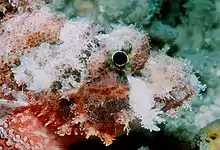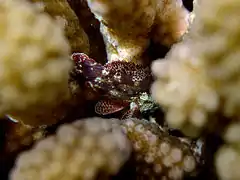| Sebastapistes | |
|---|---|
 | |
| Sebastapistes strongia | |
| Scientific classification | |
| Domain: | Eukaryota |
| Kingdom: | Animalia |
| Phylum: | Chordata |
| Class: | Actinopterygii |
| Order: | Scorpaeniformes |
| Family: | Scorpaenidae |
| Subfamily: | Scorpaeninae |
| Tribe: | Scorpaenini |
| Genus: | Sebastapistes T. N. Gill, 1877[1] |
| Type species | |
| Scorpaena strongia | |
| Synonyms[1] | |
| |
Sebastapistes is a genus of marine ray-finned fish belonging to the family Scorpaenidae, the scorpionfishes. The fishes in this genus are found in the Indian and Pacific Ocean.
Taxonomy
Sebastapistes was first described as a genus in 1877 by the American ichthyologist Theodore Gill, Gill included 3 species within the new genus and in 1898 David Starr Jordan and Barton Warren Evermann designated Scorpaena strongia which had been described by Georges Cuvier in 1829 with its type locality given as Kosrae in the Caroline Islands, as the type species.[1][2] This genus is classified within the tribe Scorpaenini, in the subfamily Scorpaeninae of the family Scorpaenidae.[3] The etymology of the genus name Sebastapistes was not explained by Gill, it may be that Sebast- is derived from Sebastichthys (a subgenus of Sebastes), which was previously a genus S. cyanostigma was classified in, or a reference to sebastin fishes in general; apistes is apistus which means "untrustworthy" or "perfidious", as these fishes are not a true rockfishes but are “intermediate between the Sebastoid and Scorpaenoid genera”.[4]
Species
The 11 recognized species in this genus are:[5]
- Sebastapistes ballieui (Sauvage, 1875) (Spotfin scorpionfish)
- Sebastapistes coniorta O. P. Jenkins, 1903 (Humpback nohu)
- Sebastapistes cyanostigma (Bleeker, 1856) (Yellowspotted scorpionfish)
- Sebastapistes fowleri (Pietschmann, 1934) (Pygmy scorpionfish)
- Sebastapistes galactacma O. P. Jenkins, 1903 (Galactacma scorpionfish)
- Sebastapistes mauritiana (Cuvier, 1829) (Spineblotch scorpionfish)

- Sebastapistes nuchalis Günther, 1874
- Sebastapistes perplexa Motomura, Aizawa & Endo, 2014 [6]
- Sebastapistes strongia (G. Cuvier, 1829) (Barchin scorpionfish)
- Sebastapistes taeniophrys (Fowler, 1943)
- Sebastapistes tinkhami (Fowler, 1946) (Darkspotted scorpionfish)

Some authorities consider that S. nuchalis is a junior synonym of S. strongia and that Scorpaena pascuensis should be included within Sebastapistes.[2]
Characteristics
Sebastapistes scorpionfishes are characterised by there being 12 spines in the dorsal fin, having teeth on the palatine and byhaving the rear lacrimal spine being directed diagonally downwards. The pored scales in the lateral line continue on to the caudal peduncle and they do not have a deep occipital pit. There are species in the deepwater scorpionfish genus Neomerinthe which share these characteristics with this genus but have different patterns of spines and scales on their heads, differing meristics and by living in deep water.[6] The size of these small scorpionfishes varies from a maximum published total length of 2.5 cm (0.98 in) in S. taeniophrys up to 11.7 cm (4.6 in) in S. ballieui.[5]
Distribution and habitat
Sebastapistes scorpionfishes are found in the Indian and Pacific Oceans from East Africa to Hawaii and Easter Island.[5] They are mostly species of shallow, tropical coastal waters but two species S. strongia and S. perplexa extend to temperate waters off Japan.[6]
References
- 1 2 3 4 Eschmeyer, William N.; Fricke, Ron & van der Laan, Richard (eds.). "Genera in the family Scorpaenidae". Catalog of Fishes. California Academy of Sciences. Retrieved 21 February 2022.
- 1 2 Eschmeyer, William N.; Fricke, Ron & van der Laan, Richard (eds.). "Species in the genus Sebastapistes". Catalog of Fishes. California Academy of Sciences. Retrieved 21 February 2022.
- ↑ J. S. Nelson; T. C. Grande; M. V. H. Wilson (2016). Fishes of the World (5th ed.). Wiley. pp. 468–475. ISBN 978-1-118-34233-6.
- ↑ Christopher Scharpf & Kenneth J. Lazara, eds. (2 October 2021). "Order Perciformes (Part 9): Suborder Scorpaenoidei: Family Scorpaenidae". The ETYFish Project Fish Name Etymology Database. Christopher Scharpf and Kenneth J. Lazara. Retrieved 17 February 2022.
- 1 2 3 Froese, Rainer and Pauly, Daniel, eds. (2021). Species of Sebastapistes in FishBase. August 2021 version.
- 1 2 3 Motomura, H.; Aizawa, M. & Endo, H. (2014). "Sebastapistes perplexa, a New Species of Scorpionfish (Teleostei: Scorpaenidae) from Japan". Species Diversity. 19 (2): 133–139.